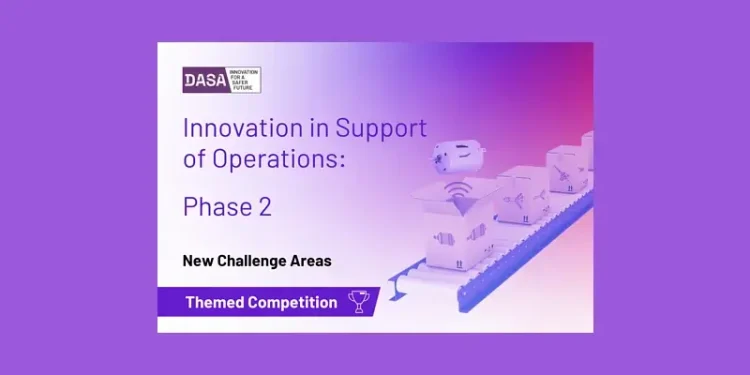The Defence and Security Accelerator (DASA) has launched Phase Two of its “Innovation in Support of Operations” competition, inviting scalable proposals across five key areas to enhance UK military capabilities.
Funded by the Ministry of Defence, this initiative aims to deploy innovative solutions within 12 months, bolstering national security and economic growth.
Accelerating Military Innovation
The launch of Phase Two by DASA marks a significant step in advancing the UK’s defence technology landscape. By focusing on areas such as UAS propulsion and autonomous navigation systems, the competition seeks to drive innovation that can be rapidly deployed.
This initiative not only strengthens national security but also provides opportunities for businesses and innovators to contribute meaningfully to defence advancements.
With a funding cap of £350,000 per proposal, the competition encourages multiple entries across three cycles ending on 20 May, 5 August, and 14 October 2025.
This structured approach ensures a steady influx of innovative ideas that can be quickly integrated into operational environments.
Effect on National Security
The focus on rapid deployment within approximately 12 months underscores the urgency of enhancing military capabilities in response to evolving threats.
The challenge areas—UAS propulsion, artillery barrel repair, autonomous navigation systems, seekers, and UAS defeat—are critical for maintaining a technological edge over adversaries.
This initiative aligns with previous DASA efforts like cooperative missile development projects aimed at enhancing missile systems through collaboration.
Such competitions are pivotal in ensuring that UK defence remains robust and adaptable in an ever-changing global landscape.
Opportunities for Innovators
- Proposals should focus on scalability and rapid deployment within 12 months
- Funding available up to £350,000 per proposal
- Three competition cycles planned for strategic idea submission
- Focus areas include UAS propulsion and autonomous navigation systems
- Aims to enhance both military capabilities and economic growth
Think you have an innovation that could be deployed at pace? Read the full Competition Document and submit your proposal.
Phase Two – expected to consist of three cycles:
| Cycle 4 | Cycle 5 | Cycle 6 | |
| Competition Launch | 2 April | 3 June | 19 August |
| Open For | 7 Weeks | 9 Weeks | 8 Weeks |
| Comp Closes | 20 May 12:00 | 5 August 12:00 | 14 October 12:00 |
All above time BST
- They expect proposals to cost no more than £350,000
- A number of proposals may be funded
The Five New Challenge Areas
| Challenge Area | Description |
|---|---|
| 1. UAS Propulsion | Novel propulsion means for small to medium UAS, and innovative manufacture/design of traditional UAS engines. |
| 2. 155mm Artillery Barrel Repair/Recondition | Innovative solutions to repair, recondition, and extend barrel life. |
| 3. Autonomous Navigation Systems | Autonomous navigation systems for UAS and USVs (air vehicles and maritime surface vessels). |
| 4. Seekers | Novel systems targeting RF transmitters, Class I(d), II, III UAS, and medium to large maritime surface targets. |
| 5. UAS Defeat | Solutions to detect and potentially defeat UAS, including non-RF reliant solutions, and novel destruction methods for Class 1(d) UAS. |
Economic Implications
The economic benefits of this competition extend beyond immediate defence enhancements. By fostering innovation within UK industries, it stimulates job creation and attracts investment into cutting-edge technologies.
This not only boosts the economy but also positions the UK as a leader in defence technology on the global stage. The potential civilian applications of these technologies further amplify their impact.
For instance, advancements in UAS defeat could influence future civil aviation security measures, showcasing how military innovations can have broader societal benefits.
Additional Reading
Moving Forward
DASA’s latest competition phase represents a crucial opportunity for innovators to contribute to national security while driving economic growth through technological advancements.
As these initiatives unfold over the coming years, they promise not only enhanced military capabilities but also broader societal impacts through potential civilian applications.
Discover more of Todays Top Breaking News Stories!
Sources: Gov.uk, Ministry of Defence, and Thales Group Missile Systems.
Ivan Alexander Golden, Founder of THX News™, an independent news organization dedicated to providing insightful analysis on current events, prepared this article.









